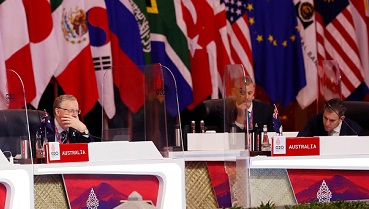The Australian Alert Service is the weekly publication of the Australian Citizens Party.
It will keep you updated on strategic events both in Australia, and worldwide, as well as the organising activities of the Citizens Party.
To subscribe to the Australian Alert Service, it's easy, and it's secure.
Lead Editorial
27 July 2022
Vol. 24 No. 30
In an update to its April World Economic Outlook, the IMF has downgraded its already dire forecast, saying “The world may soon be teetering on the edge of a global recession, only two years after the last one.”
On the first sitting day of parliament, 26 July, Prime Minister Anthony Albanese told the media pack that “there are challenges with our economy”, strengthening his words slightly in an interview with ABC’s 7.30 to say, “We face economic headwinds”.
Following the G20 finance ministers’ meeting he attended on 15-16 July, Treasurer Jim Chalmers said the world economy was currently sitting in a “difficult, if not dangerous place”.
Chalmers will deliver an economic statement to parliament on 28 July, ahead of the October budget. The Prime Minister told the Australian on 20 July that there won’t be any new revenue-raising measures in that budget; rather, it will be focused on finding savings. Chalmers says the budget update will be “confronting” in many ways and that he will seek to “trim spending” at every opportunity, particularly given rising debt. Government expenditures, he said, are “costing more and more to service because every dollar, every additional dollar in the budget is a borrowed dollar and that now costs us more to pay back because of rising interest rates.”
This argument betrays the wrongheaded thinking assuring the failure of this approach. Austerity does not work! It did not work after the global financial crisis. Slashing government budgets after World War I did not work to restore the “golden era of Liberalism” (based on British economic laws later revamped as neoliberalism)—it led squarely into the Great Depression, and World War II.
To take up Chalmers’ flawed thinking: First, the bulk of the increase in foreign borrowings is linked to the housing bubble. Its (until now) constant expansion has seen banks sourcing more and more credit overseas. Around a third of our banks’ funding comes from “large and deep foreign funding markets”, says the RBA. This debt has nothing productive to show for it!
Furthermore, Australia was hit harder than it should have been by the “COVID-19 recession” because our economy is too services-dependant. With more manufacturing and industry we would not have run up such a massive bill to cover temporary economic shutdowns.
Addressing that problem by investing in the real economy would put us on the pathway to fixing the new inflation crisis. Establishing a financial system which serves the real economy, with rapid injections of credit for infrastructure projects, rebuilding flood and fire crisis zones, and cranking up local supply chains would completely transform the economy and curb inflation. As productivity increases and the supply of needed products expands, prices will stabilise.
Another factor is that when state and federal governments sell bonds to make up for budget shortfalls, over 50 per cent are purchased by foreign investors. But, Dr Chalmers, we don’t have to borrow from overseas at all! The last labour government that tried to defy the “rules”, that of Gough Whitlam, was punished simply for sourcing offshore loans from outside City of London/Wall Street-sanctioned networks. But Whitlam’s Treasurer and Deputy Prime Minister Jim Cairns made clear that the government could have borrowed from our own Reserve Bank, just as it had borrowed from the Commonwealth Bank during WWII, through Treasury Bills. Labor had been scared off that approach, Cairns observed however, because they had been consigned to Opposition for 23 years after Ben Chifley tried to nationalise the banks in 1949.
The Citizens Party’s legislation for a Commonwealth Postal Savings Bank will put Australia on a new path. And if the big banks’ reasons for closing branches are genuine, they would welcome the proposal (p. 3). It absolves them of their responsibility to maintain "expensive" branches if they don’t wish to—but it brings in a new element they don’t like: public competition!
In this issue:
- How a public postal bank would work in Australia
- Must watch! New Zealand Statesman denounces Five-Eyes/NATO Pacific war plan
- Converge on Canberra for Assange on Thursday
- ASPI blames its failing credibility on Chinese ‘information operations’
- Biden visits Middle East: a festival of threatening Iran
- Staged incidents as the Western approach to doing politics
- Big economic moves at Russia-Iran summit
- Take the economic pathway to resolution with China
- Real economic metric shows no excluding Russia, China!
- Celebrate International Moon Day!
- Successful launch of China’s Space Station lab module
- A serious government needs a public bank!
- In Memoriam—George Liebmann (1937–2022)
- A public post office bank is the answer to many cries for help
- How the British Empire wrecked Russian-American cooperation and launched the Cold War (continued)
Click here for the archive of previous issues of the Australian Alert Service
-








